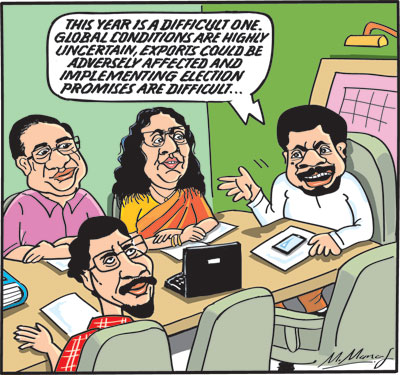Columns
Formidable economic challenges amid political compulsions and global uncertainties
View(s):
A chieving economic growth amid political expectations, global uncertainties, trade wars, and a global economic downturn is an enormously challenging task for our trade-dependent economy.
Policies
The pursuance of policies for economic stability and growth is difficult owing to the government’s election promises that have to be fulfilled. Nevertheless, it is vitally important to pursue policies that strengthen economic fundamentals and do not destabilise the economy.
Economic outlook
The global economic outlook this year is difficult to gauge or predict owing to threats from the United States’ President-elect Donald Trump. His statements have led to fears of severe disruptions in global trade, with the US expected to impose high tariffs on imports and even ban certain imports from China.
International trade
As a consequence, international trade is expected to slow down drastically. China and India are expected to be severely affected by the US trade restrictions, as the US is their main market.
Adverse impacts
High import tariffs would have adverse impacts on the US economy as well, including inflation and disruption in US manufacturing chains that rely on imported materials and components.
Our focus
The focus of this column is, however, on the impact of US trade policies on the Sri Lankan economy. Sri Lanka’s manufactured exports too would be adversely affected, as the US market accounts for about 70 percent of the country’s manufactured exports. This is especially so for garments that are the Island’s main industrial export. Such setbacks are feared at a time when there has been a spurt of exports to a record US$ 14 billion in the first 11 months of 2024.
Economic recovery
The country’s economic recovery may face a severe blow as a result of a global recession and trade restrictions. The economy is expected to have grown by about 3 to 3.5 percent last year, and this growth momentum that was expected to accelerate this year is likely to face a setback.
Tourism
The spectacular rise in earnings from tourism last year and growth in exports resulted in a rare trade surplus and a balance of payments surplus in 2024 that strengthened the country’s external reserves.
Severe threat
The gloomy prospects for exports due to trade barriers are as much of a concern for China and India as for our trade-dependent economy.
Economic policies
The inability to implement needed economic policies for stability and growth could pose a severe threat to economic growth. The political compulsions to fulfil election promises of increasing wages and salaries, reducing taxes, enhancing social security payments, and fertiliser subsidies, and the unexpected flood damage expenditure would increase government expenditure without commensurate increases in revenue. Consequently, the fiscal deficit could increase to a level that threatens economic stability and growth.
Fiscal deficit
The containment of the fiscal deficit may pose the toughest economic challenge for the government in 2025. The thrust of economic policies has been to increase government expenditure in spite of pursuing a revenue-enhancing strategy. Admittedly, there have been some expenditure reduction efforts as well.
Election promises
The fulfilment of election promises to enhance government expenditure, provide tax reliefs, and increase social security payments is likely to widen the fiscal deficit. In addition, the damages caused by floods and the recent natural disasters and the enhanced fertiliser subsidy to farmers would increase government expenditure significantly.
The only sign of a curtailment in government expenditure has been the reduction of wasteful government expenditure, such as on ceremonies, ministerial perks, and the upkeep and security of past presidents, and the reduction in overseas costs of foreign missions. While these are essential austerity measures, their impact on the reduction of government expenditure may not be significant enough to cause a dent in the public expenditure.
A two-pronged strategy to increase revenue collection while reducing government expenditure is needed to achieve fiscal consolidation.
Budget
We have to wait and see how the government will achieve this. The chances are that there would be overruns in government expenditure and underruns in revenue collection, as have been in past budgets.
Recapitulation
The year ahead is likely to be a very challenging one for the Sri Lankan economy. Not only are the economic problems formidable, but the international economic environment is also likely to be inhospitable and nonconducive for the country’s exports. Consequently, the external finances that were improving last year could suffer a setback that the country could ill afford.
The reduction of the fiscal deficit is imperative for economic stability and economic growth, and conforming with the conditions for continuing with the IMF’s Extended Fund Facility (EFF) will be challenging. In whatever direction one looks, there are serious challenges and difficulties.
Conclusion
Resolving the country’s economic problems is a formidable task. The popular expectations are, however, high that there would be increased public expenditure that would benefit people, while reduced taxation would provide relief to workers and professionals. Such a prospect is unlikely in an economy that is struggling to achieve economic stability while facing serious international uncertainties and external challenges.
Buying or selling electronics has never been easier with the help of Hitad.lk! We, at Hitad.lk, hear your needs and endeavour to provide you with the perfect listings of electronics; because we have listings for nearly anything! Search for your favourite electronic items for sale on Hitad.lk today!


Leave a Reply
Post Comment